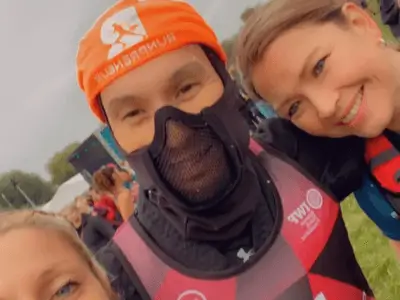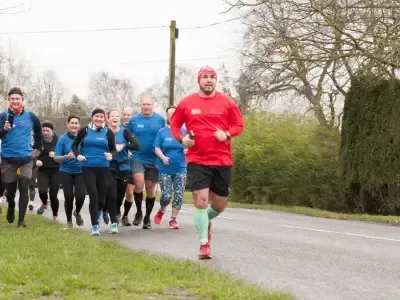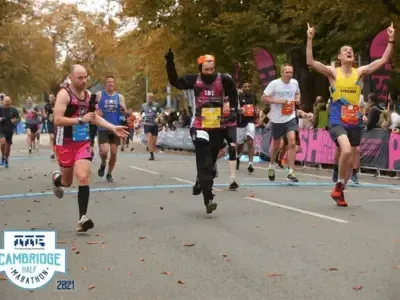Runpreneur Journey Blog
Embark on an extraordinary journey with the Runpreneur community. Discover inspiring stories, insider tips, and the transformative power of our global challenge. From first-time runners to seasoned athletes, our blog captures the essence of the Runpreneur movement, inspiring others to join the cause.

Runpreneur Blog: Mastering Marathon Nutrition – A First-Hand Account
Runpreneur Blog: Mastering Marathon Nutrition –
A First-Hand Account
Hello, fellow runners and marathon enthusiasts! It's Kevin Brittain here, and today, I'm diving deep into one of the most critical aspects of marathon preparation: nutrition. Buckle up for some carb-loading talk and insight into my nutritional plan for race day.
Welcome Back
It's consecutive day 1580 of my Runpreneur vlog! For those new here, I am on a mission to save the lives of children by running the ultimate ultra-marathon — documenting my runs every single day for a distance equal to a lap around the world, all done barefoot. Every subscribe, share, like, and comment helps us reach more people and raise more money to save these young lives.
The Importance of Fuelling
Marathon nutrition is something I've learnt through both triumph and failure. Proper nutrition has led me to achieve some decent marathon times, while poor nutrition has seen me hit the infamous "wall." For those unfamiliar, hitting the "wall" in an endurance event like a marathon is one of the worst feelings imaginable. It's about ensuring my body has enough fuel to keep going, and trust me, it makes all the difference.
The Science of Carb-Loading
Let's dive into carb-loading. In simple terms, carb-loading is about maximising your carbohydrate intake 48 hours before race day. Carbohydrates are crucial because they provide your body with glycogen, the primary energy source during the race. When you hear horror stories of people running out of energy mid-race, it's often due to not paying enough attention to their fuelling strategy.
Though I'm not a nutritional expert, I rely heavily on scientific knowledge and personal experience. One key fact is that your body can only absorb about 15 grams of carbohydrates every 15 minutes — that's 60 grams of carbohydrates per hour. If you try to consume more than that, your body won't efficiently absorb the excess, making it essential to spread out your intake.
My Carbohydrate Strategy
Usually, two days before the marathon, which is a Friday if the race is on a Sunday, I begin my carb-loading process. The aim is to get in as much carbohydrate as I can stomach, which ensures my glycogen storage is at its peak by race day. Here's what my routine looks like:
Breaking Down Meals:
I aim for 30 grams of carbohydrates every 30 minutes.
Meals are broken down into smaller portions, spread across half-hour intervals.
Typical high-carb foods include pasta, potatoes, fruits, and even energy drinks and sweets.
Using Technology:
Recently, I've been using the Zoe app to better understand how different foods affect my body, allowing me to tailor my carb-loading more effectively.
Race Day Routine
On race day, I stick to the rituals that have proven successful:
Pre-Race Breakfast:
3 to 3.5 hours before the race, I have a breakfast rich in carbs. My go-to is porridge with a banana and honey.
Carb Intake Until Start:
I follow with bananas, energy bars, and energy drinks, adhering to that 30-gram carbohydrate rule every 30 minutes.
About an hour before the race, I switch to energy gels, ensuring my carb intake remains high without overloading my stomach.
Hydration Matters
While carb-loading, staying hydrated is equally important. Starting a day before the marathon, I consume hydration tablets with electrolytes, making sure my body retains the fluids it needs. Here’s a quick hydration plan:
48 Hours Before:
Drink 1.5 to 2 litres of fluids daily.
24 Hours Before:
Increase intake to 2.5 litres, incorporating electrolyte tablets.
Race Day:
Maintain high hydration levels without feeling too heavy or bloated.
During the Race
To keep myself fuelled during the marathon:
Gels and Sweets:
Every 30 minutes, I consume energy gels and energy sweets alternately to maintain my carb intake.
Aim for 30 grams of carbohydrates every half-hour cycle.
This well-structured nutritional plan allows me to maintain my energy levels and keep my body performing optimally. Following these steps makes a phenomenal difference between a marathon that's manageable and one that's sheer torture.
Final Thoughts
So, to summarise:
Carb-load 48 hours before the race,
Aim for high-carb foods every 30 minutes during meals.
Hydrate thoroughly with electrolytes and fluids.
On race day,
Continue the carb intake pattern right up until the race starts.
Keep fuelling and hydrating as you run.
This strategy has served me well, and I hope it proves beneficial for you too.
Remember, if you have any questions, drop them in the comments. I'll respond to everyone. And please, if you believe in my mission, give this a subscribed, share, like, and comment. Together, we can save more children's lives.
Stay positive, stay happy. I'll see you again tomorrow!
--- Kevin Brittain

Kevin's 40,075km Challenge: Raising £1 Million for Children
Meet Kevin, a dedicated Runpreneur who embarked on an extraordinary journey to raise £1 million for children in need. Over the course of his 40,075km challenge, Kevin's unwavering determination and passion inspired thousands to join the Runpreneur movement.

Runpreneur Vlogging: Capturing Kevin's Journey
Experience the Runpreneur challenge through the lens of Kevin's video diary. Witness his ups and downs, the camaraderie of the community, and the transformative power of running for a cause. Dive into the visual stories that capture the essence of the Runpreneur movement.

Empowering Children, One Step at a Time
As Kevin logged every kilometre of his 40,075km challenge, the true purpose behind his journey came into focus. Each step, each bead of sweat, fuelled essential healthcare, education, and nutrition programs for children in need around the world.

The Transformative 4x4x48 Challenge
Experience the thrill and personal growth of our iconic 48-hour running event. Witness the determination and resilience of Runpreneurs as they push their limits, one mile at a time.

Runpreneur Vlogging: Capturing the Journey
Dive into the visual stories of our Runpreneurs as they document their experiences through engaging video logs. Witness the challenges, triumphs, and moments of camaraderie that define the Runpreneur spirit.





















